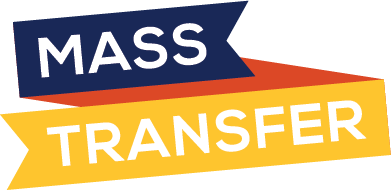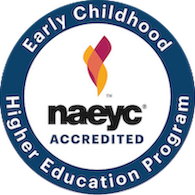Education Department
A Great Place to Begin Your Future
- Education Department Home
- FALL 2024 COURSES
- DEGREE PROGRAMS
- Early Childhood Associate Degree
- Elementary Ed. Associate Degree
- CERTIFICATE PROGRAMS
- ECE Introductory Teacher Certificate
- ECE Leadership Certificate
- PRACTICUM & FIELD PLACEMENTS
- General Information
- Frequently Asked Questions (FAQs)
- Practicum Application
- FINANCIAL AID OPPORTUNITIES
- ECE Career Pathways Program
- MassReconnect Program
- Early Childhood Educators (ECE) Scholarship
- Community Collaboration
- R.E.A.C.H. Conceptual Framework
- Professional Development Opportunities
- Contacts & Faculty
Early Childhood Education Associate and Transfer Degree

The Early Childhood Education Associate in Science degree program provides the educational background and supervised training for students interested in working with young children. With an emphasis on translating theory into practice, students conclude the program in a capstone Supervised Practicum and Seminar. This degree program also prepares students to transfer into a bachelor's degree program leading to teacher licensure.
Effective early childhood educators are critical for realizing the early childhood profession’s vision that each and every young child, birth through age 8, have equitable access to high-quality learning and care environments. As such, there is a core body of knowledge, skills, values, and dispositions early childhood educators must demonstrate to effectively promote the development, learning, and well-being of all young children.
As such, it is MCC's Early Childhood Education Associate degree program's mission to prepare teacher candidates in the key areas of:
- Child Development and Learning in Context: Early childhood educators are grounded in an understanding of the developmental period of early childhood from birth through age 8 across developmental domains. They understand each child as an individual with unique developmental variations. Early childhood educators understand that children learn and develop within relationships and within multiple contexts, including families, cultures, languages, communities, and society. They use this multidimensional knowledge to make evidence-based decisions about how to carry out their responsibilities.
- Family–Teacher Partnerships and Community Connections: Early childhood educators understand that successful early childhood education depends
upon educators’ partnerships with the families of the young children they serve. They
know about, understand, and value the diversity in family characteristics. Early childhood educators use this understanding to create respectful, responsive, reciprocal relationships with families and to engage with them as partners in their young children’s development and learning. They use community resources to support young children’s learning and development and to support children’s families, and they build connections between early learning settings, schools, and community organizations and agencies.
- Child Observation, Documentation, and Assessment: Early childhood educators understand that the primary purpose of assessment is to inform instruction and planning in early learning settings. They know how to use observation, documentation, and other appropriate assessment approaches and tools. Early childhood educators use screening and assessment tools in ways that are ethically grounded and developmentally, culturally, ability, and linguistically appropriate to document developmental progress and promote positive outcomes for each child. Early childhood educators build assessment partnerships with families and professional colleagues.
- Developmentally, Culturally, and Linguistically Appropriate Teaching Practices: Early childhood educators understand that teaching and learning with young children is a complex enterprise, and its details vary depending on children’s ages and characteristics and on the settings in which teaching and learning occur. They understand and demonstrate positive, caring, supportive relationships and interactions as the foundation for their work with young children. They understand and use teaching skills that are responsive to the learning trajectories of young children and to the needs of each child. Early childhood educators use a broad repertoire of developmentally appropriate and culturally and linguistically relevant, anti-bias, and evidence-based teaching approaches that reflect the principles of universal design for learning.
- Knowledge, Application, and Integration of Academic Content in the Early Childhood Curriculum: Early childhood educators have knowledge of the content of the academic disciplines (e.g., language and literacy, the arts, mathematics, social studies, science, technology and engineering, physical education) and of the pedagogical methods for teaching each discipline. They understand the central concepts, methods and tools of inquiry, and structures in each academic discipline. Educators understand pedagogy, including how young children learn and process information in each discipline, the learning trajectories for each discipline, and how teachers use this knowledge to inform their practice. They apply this knowledge using early learning standards and other resources to make decisions about spontaneous and planned learning experiences and about curriculum development, implementation, and evaluation to ensure that learning will be stimulating, challenging, and meaningful to each child.
- Professionalism as an Early Childhood Educator: Early childhood educators identify and participate as members of the early childhood profession. They serve as informed advocates for young children, for the families of the children in their care, and for the early childhood profession. They know and use ethical guidelines and other early childhood professional guidelines. They have professional communication skills that effectively support their relationships and work young children, families, and colleagues. Early childhood educators are continuous, collaborative learners who develop and sustain the habit of reflective and intentional practice in their daily work with young children and as members of the early childhood profession.
SEE A LISTING FALL 2024 COURSES OFFERED.
 This program qualifies for MassTransfer, which guarantees credit transfer to Massachusetts state universities and the University
of Massachusetts. Academic advisors and transfer counselors work closely with students
to plan course selections in accordance with their intended bachelor’s degree major
and transfer institution.
This program qualifies for MassTransfer, which guarantees credit transfer to Massachusetts state universities and the University
of Massachusetts. Academic advisors and transfer counselors work closely with students
to plan course selections in accordance with their intended bachelor’s degree major
and transfer institution.MassTransfer seeks to reward community college students who complete associate degrees at Massachusetts community colleges before they enroll in linked baccalaureate programs at Massachusetts state universities or University of Massachusetts campuses. Not only does MassTransfer guarantee full transfer of a minimum of 60 credits but, depending on their final GPA and/or prerequisite coursework, students who complete associate to baccalaureate (A2B) degrees may also receive guaranteed admission and tuition discounts. A2B agreements guarantee that courses listed and taken as major requirements at Middlesex will be accepted as major requirements at receiving institutions. Currently, Middlesex's ECE AS and Transfer degree has A2B linked agreements in place with ten ECE baccalaureate programs at seven Massachusetts state universities.
Program Notes:
- Courses are delivered through a variety of modalities including weekend schedules,
hybrid, online, and traditional face-to-face options, and students may be eligible for financial assistance through financial aid, scholarships
and/or grant funding. Please visit the ECE Career Pathways Program page for more information.
- Eligibility or successful completion of English Composition I (ENG101) is a pre-requisite for all program courses.
- Additional coursework may be required based on college placement testing.
- Students are required to meet with academic advisors for proper course sequencing and transferability.
- In order for a student to be eligible to participate in an academic, community or clinical program that involves potential unsupervised contact with children, the disabled, the elderly, or other vulnerable populations, the student may be required to undergo a Criminal Offender Record Information (CORI) check and/or a Sex Offender Registry Information (SORI).
The Early Childhood Education and Transfer degree at Middlesex Community College is
accredited by the Commission on the Accreditation of Early Childhood Higher Education
Programs of the National Association for the Education of Young Children, www.naeyc.org. The accreditation term runs from March, 2023 through March, 2025.
Click here to view NAEYC Reported Program Outcome Data.